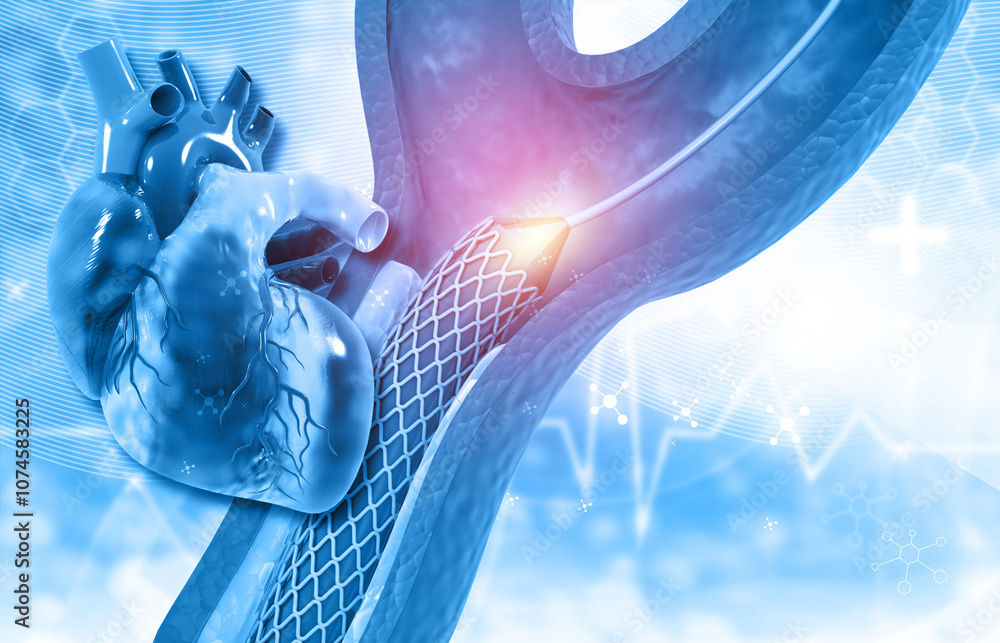Sleep Issues Post-Heart Attack: Understanding and Improving Sleep Quality
Explore causes and solutions for sleep issues after a heart attack. Learn how sleep impacts recovery and find tips to improve sleep quality for better heart health.

Written by Dr Sonia Bhatt
Last updated on 3rd Jul, 2025
A heart attack can change the path of one’s life. Beyond the primary and immediate concerns about heart health, many individuals recovering from a heart attack may also experience changes in their sleeping patterns. Sleep issues post-heart attack are a significant, but often overlooked, aspect of the recovery process.
The Connection Between Heart Health and Sleep
To understand the challenges faced by heart attack survivors, it is important to understand how heart health affects sleep. The relationship between the cardiovascular system and the sleep-wake cycle is complex. When someone suffers a heart attack, their body undergoes both physiological and emotional stress, which may lead to poor sleep. Moreover, medications used after a heart attack, like beta-blockers and ACE inhibitors, can affect sleep patterns. This can even cause insomnia or disrupted sleep. Disrupted sleep after a heart attack can lead to a higher risk of further cardiovascular complications. Disrupted sleep can increase the risk of hypertension, arrhythmias and even another heart attack in patients recovering from a heart attack. Thus, addressing sleep issues is an important part of the recovery journey.
Common Sleep Issues After a Heart Attack
After a heart attack, many individuals face sleep disturbances that can hinder recovery. Understanding these sleep disturbances and their underlying causes is the first step toward better managing them for improved health and recovery.
1. Insomnia
One of the most prevalent sleep problems experienced by heart attack patients is insomnia. Insomnia is a condition where one finds it difficult to initiate sleep, maintain sleep throughout the night, or wake up too early and be unable to return to sleep. Multiple factors contribute to this issue:
Emotional Strain: The stress and anxiety that come with surviving a heart attack can make it tough to relax and drift off to sleep.
Physical Unrest: Pain or discomfort due to surgical procedures due to cardiac events can disrupt one's ability to find a comfortable sleeping position.
Routine Adjustments: Adapting to new medication schedules, dietary changes, and exercise routines can disturb established sleep patterns.
2. Obstructive Sleep Apnea (OSA)
Obstructive sleep apnea (OSA) is a condition where the breathing airway is repeatedly blocked during sleep, causing temporary interruptions in breathing. This disorder is common in individuals with cardiovascular problems and poses particular challenges like oxygen level reduction, hypertension and arrhythmias for heart attack survivors:
3. Nightmares and Night Sweats
Emotional stress from the trauma of a heart attack can lead to vivid nightmares or night sweats. The psychological impact of experiencing a heart attack can affect the brain’s ability to regulate sleep, leading to disturbed sleep cycles. People who have post-traumatic stress disorder (PTSD) after a heart attack may be more prone to these types of sleep disturbances.
4. Restless Legs Syndrome (RLS)
Restless legs syndrome (RLS) involves an uncomfortable sensation in the legs, accompanied by an uncontrollable urge to move them, typically worsening at night and disrupting sleep. Heart attack survivors may experience RLS due to:
Medication Effects: Some medications prescribed for heart disease management, like certain antihypertensives, may exacerbate RLS symptoms.
Iron Deficiency: Iron deficiency, which can result from chronic disease or medication side effects.
5. Excessive Daytime Sleepiness
After a heart attack, individuals may experience excessive daytime sleepiness, which can result from disrupted sleep at night. Persistent fatigue, caused by poor quality sleep, can make it difficult for individuals to stay awake and alert during the day, impeding their ability to function normally. Medications that induce drowsiness or lower energy levels can also worsen daytime sleepiness.
Why Sleep is Vital for Heart Attack Recovery
Sleep plays a crucial role in the body’s healing process, especially after a traumatic event like a heart attack. A good sleep is essential for heart attack recovery for the following reasons:
Physical Repair: During sleep, our body performs repair and regeneration processes. For heart attack survivors, sleep provides the opportunity for the heart muscle to heal and for inflammation to subside. Inadequate sleep can hinder these processes, potentially delaying recovery and increasing the risk of further heart problems.
Emotional Well-being: Sleep is also important for mental health. After a heart attack, patients may experience depression, anxiety, or feelings of vulnerability. Quality sleep helps regulate mood and reduce stress, making it easier to cope with the emotional challenges of recovery.
Immune System Function: A well-rested body has a stronger immune system. Since a heart attack can weaken the immune system, good sleep is essential for fighting infections and preventing complications, particularly in the weeks and months following the event.
Heart Function: Adequate sleep supports the overall function of the cardiovascular system. Sleep helps regulate blood pressure, reduce inflammation, and manage heart rate—all of which are critical for someone recovering from a heart attack.
How to Manage Sleep Issues After a Heart Attack
While sleep disturbances post-heart attack are common, there are several steps heart attack survivors can take to improve their sleep quality and overall well-being.
Stick to a Regular Sleep Schedule: Consistency is key to sleep. Going to bed and waking up at the same time each day, even on weekends, can help regulate your body’s internal clock, making it easier to fall asleep and wake up feeling rested.
Create a Comfortable Sleep Environment: A restful sleep environment is vital for improving sleep quality. Make sure your bedroom is cool, quiet, and dark. Consider using blackout curtains, earplugs, or a white noise machine to eliminate disruptions. A comfortable mattress and pillow that support your preferred sleeping position can also significantly improve sleep quality.
Limit Stimulants and Alcohol: Avoid caffeine, nicotine, and alcohol in the hours leading up to bedtime. Caffeine and nicotine are stimulants that can make it harder to fall asleep, while alcohol, although initially sedating, can disrupt the sleep cycle, leading to poor-quality sleep.
Engage in Relaxation Techniques: Relaxation exercises, such as deep breathing, meditation, progressive muscle relaxation, or yoga, can help calm the mind and prepare the body for sleep. These techniques are particularly helpful for individuals dealing with stress or anxiety after a heart attack.
Manage Pain Effectively: Chronic pain can significantly disrupt sleep, so managing discomfort effectively is important. Talk to a healthcare provider about pain management options, including medications or non-pharmacological treatments such as physical therapy or heat/cold therapy.
Exercise Regularly (But Not Before Bed): Physical activity promotes better sleep, but it's important to avoid vigorous exercise right before bedtime, as it may have the opposite effect. Aim for light-to-moderate exercise during the day, which can help reduce stress and improve sleep quality. Always consult with your doctor before starting any new exercise routine, especially after a heart attack.
Seek Help for Sleep Apnea: If someone suspects that sleep apnea is contributing to his sleep difficulties, he should seek medical advice. A healthcare provider may recommend a sleep study to diagnose sleep apnea and discuss treatment options. Continuous Positive Airway Pressure therapy is a common treatment that can help keep the airways open during sleep.
Monitor Medication Side Effects: Some medicines prescribed for heart attack patients can interfere with sleep. One has to consult a medical professional, if one experiences sleep issues related to medication, to discuss possible alternatives or adjustments.
Conclusion
Sleep issues are a common challenge for many individuals recovering from a heart attack. However, understanding the causes of sleep disturbances and taking the required steps to address them can significantly improve overall health and recovery. Heart attack survivors can improve their sleep quality along with their cardiovascular health by following a healthy sleep routine and addressing underlying medical issues like sleep apnea. With patience, support, and effective strategies, individuals can overcome sleep problems and reclaim restful, restorative sleep, ensuring a stronger and healthier future.
Consult Top Cardiologists
Consult Top Cardiologists

Dr. Amit. A. Bharadiya
Cardiologist
12 Years • MBBS, MD General Medicine, DNB Cardiology, FSCAI
Maharashtra
Surabhi Hospital, Maharashtra, Maharashtra

Dr. S B Bhattacharyya
Cardiologist
22 Years • MBBS, MD(General Medicine),DM (Cardiology)
Kolkata
Gariaheart Clinic, Kolkata
Dr. Jayarajah Mariappan
Cardiologist
45 Years • MBBS, MD(GEN MEDICINE), DM(CARDIOLOGY)
Chennai
Sooriya Hospital, Chennai

Dr. Sumanta Chatterjee
Cardiologist
12 Years • MBBS,MD General Medicine,DM Cardiology
Kolkata
HealthYou Speciality Clinic & Diagnostics., Kolkata
(25+ Patients)

Dr. Mangesh Danej
Cardiologist
8 Years • MBBS, MD (General Medicine), DNB (Cardiology)
Pune
Dr Danej clinic, Pune
(375+ Patients)




